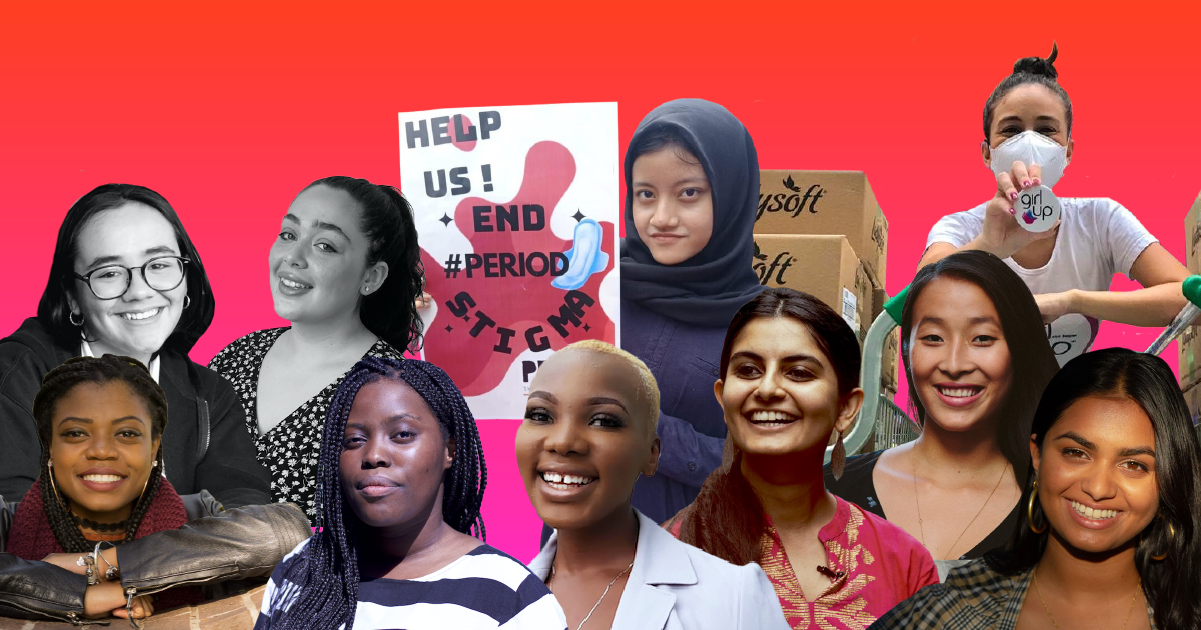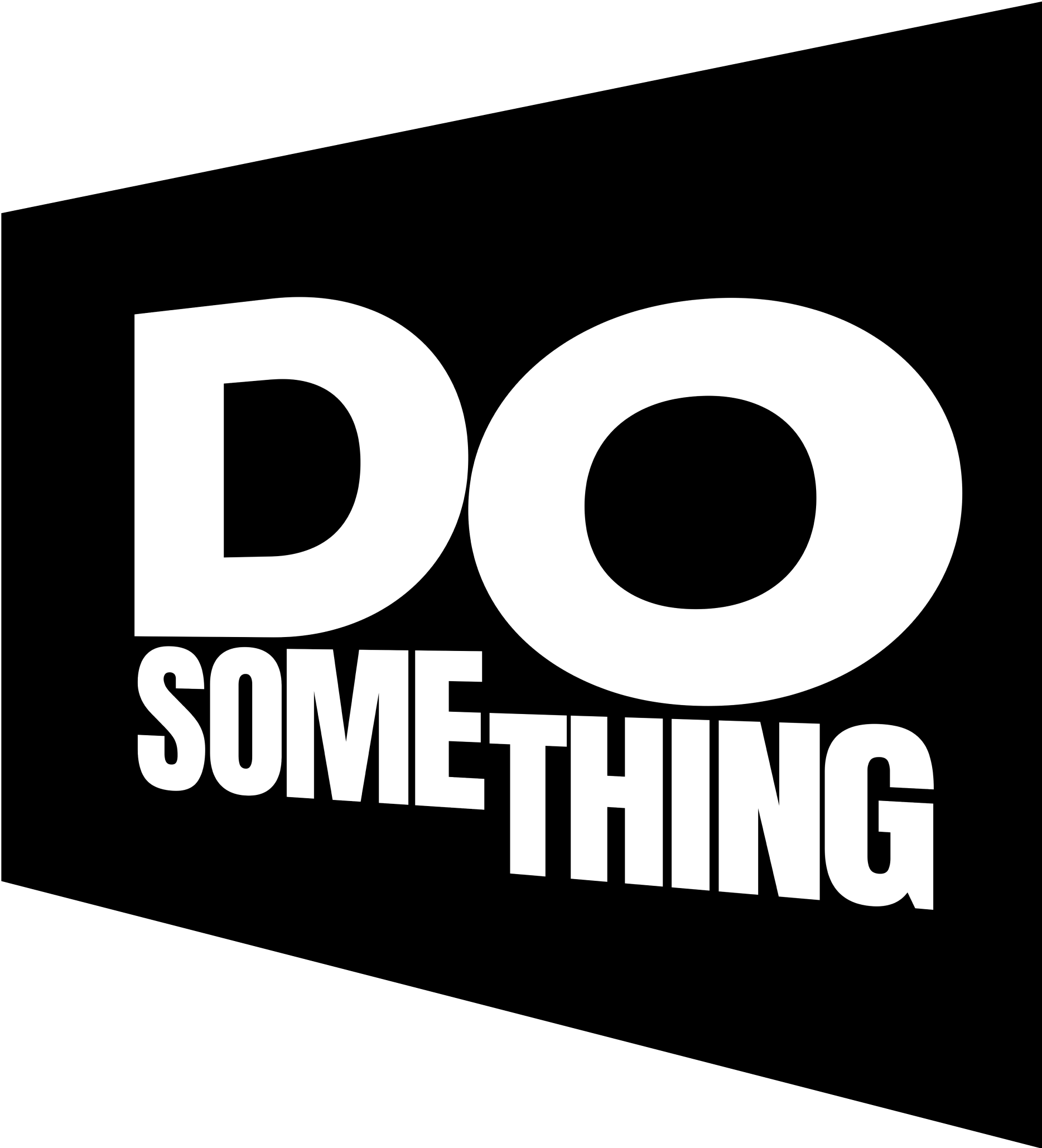10 Young People Fighting Period Poverty and Stigma Around the World
Power to the period!

As DoSomething celebrates Women's History Month -- the extraordinary contributions of the women of the past, as well as those that continue to progress us toward a more sustainable and equitable future -- we also recognize the challenges many women still face in the fight toward that equality. Including, #periodpoverty.
“Period poverty” refers to a lack of access to sanitary products, menstrual hygiene education, and water and sanitation infrastructure. It’s an issue that affects people all over the world, and the financial burdens compounded by the COVID-19 pandemic has made it even harder for folks to get the products they need. (FYI: People of all genders menstruate -- including transgender men and non-binary folks.)
At the height of the pandemic in India, only 15% of young people had access to store-bought sanitary products. In the UK, almost one-third of women and girls surveyed struggled to afford period products during COVID-19 lockdowns. Here in the US, one in four have more difficult time managing their periods because of the financial strain caused by the pandemic. And because of instability in their countries, women refugees of Haiti and Ukraine are without essential medical and hygienic needs.
That’s why these young people are leading the charge for period equity and access in their communities by distributing sanitary products, increasing menstrual health education, and advocating for policy change.
Want to get involved in the fight against period poverty? Collect and donate unopened packages of period products for local shelters through DoSomething’s Power to the Period campaign.
1) Yanique Brandford, 23, Canada
While growing up in Jamaica, Yanique Brandford, her sister, and her mother experienced period poverty firsthand. When money was tight, her mom would make homemade pads from materials like cardboard, paper, and plastic. After her family immigrated to Canada, Yanique realized that this was an issue affecting people globally, which led her to start Help a Girl Out, a nonprofit that distributes period product care packages to folks in the Greater Toronto Area. She recently became the first-ever recipient of the Canada’s Hero Award from Global Citizen.
2) Alisha Triawan, 17, Indonesia
For a lot of Indonesian girls, menstruation is so deeply stigmatized that they’re left totally unprepared for getting their first period. When Alisha Triawan got hers, she realized just how little she learned about menstrual health and hygiene, and she was left to figure it out on her own while facing bullying and harassment from her peers. Instead of staying silent, Alisha decided to speak up and start the Jakarta chapter of PERIOD. Through the organization, she distributes sanitary products and provides menstrual education to help fight period poverty and stigma in the country.
3) Candice Chirwa, 24, South Africa
As an academic, Candice Chirwa was moved by the work of postcolonial and Black feminists, which encouraged her to think critically about human rights and gender equality. That’s why she started the nonprofit Qrate to help bring visibility to menstruation in South Africa through workshops that teach young people to manage and understand their menstrual health. Candice is known as the “Minister of Menstruation” on social media, where she answers questions and starts conversations about period poverty and taboos.
Power to the Period
Collect and donate unopened packages of period products for local shelters.
4) Amika George, 21, England
At just 17 years old, Amika George started the #FreePeriods campaign to urge every public school and college in England to provide period products for their students. She collected hundreds of thousands of petition signatures and led a protest outside the residence of then-Prime Minister Theresa May. After she crowdfunded enough money to take legal action, the government finally announced that they’d provide funding for period products in primary and secondary schools and colleges. Amika’s hope is that no student will need to miss out on their education because they don’t have access to hygiene products.
5) Helena Branco, 18, Brazil
When Helena Branco learned that pads and tampons weren’t considered essential products under Brazilian tax law, she set out to change it. Helena and her friends were already a part of GirlUp, a girl’s leadership initiative from the United Nations, so they had no problem gathering a team to to help with the #AbsorventeUrgente campaign. They mobilized young people to donate and distribute over 60,000 menstrual products nationwide, which caught the attention of the Legislative Assembly of Rio de Janeiro. After meeting with Helena and her team, lawmakers introduced and passed a bill to reduce taxes on menstrual products.
6) Suhani Jalota, 26, India
For over 10 years, Suhani Jalota has been amplifying the voices of women in Mumbai’s urban slums. Working with community leaders, Suhani founded the Myna Mahila Foundation, which empowers the women to create their own solution to period poverty. Through the foundation, they’re trained and employed to make affordable and environmentally friendly sanitary products, which are then delivered to other women in slum communities. Since its inception in 2015, they’ve distributed 550,000 pads, and Suhani has been named a 2017 Queen’s Youth Leader and a 2020 Cisco Youth Leader finalist.
7) Nadya Okamoto, 23, USA
Nadya Okamoto’s interest in menstrual hygiene started when her family was experiencing homelessness years ago. She met and spoke with women in shelters who struggled to afford necessary period products. This inspired her to launch PERIOD, a youth-led organization for period equity that’s since gone global. Through PERIOD, Nadya distributes menstrual products to those in need and champions menstrual equity in policy. She spearheaded the first National Period Day in 2019, where PERIOD chapters hosted rallies in all 50 states and four countries.
8) Lolo Cynthia, 25, Nigeria
An estimated 65% of women in Nigeria cannot afford sanitary pads. To tackle this issue, Lolo Cynthia developed an initiative to both increase access to hygiene products and help those experiencing poverty generate wealth. Through workshops, she teaches women and girls to sew washable pads from linen and cloth, gives them materials to make more at home, and teaches them about comprehensive menstrual and reproductive health. Lolo works to break down the stigma around reusable pads and period in general, since a lot of folks still associate them with uncleanliness and shame. She also writes about these topics and more on her blog, LoloTalks.
9) Mya Abdelwahab, 17, and Nicole Soret, 16, USA
When COVID-19 lockdowns struck New York City, high schoolers Mya Abdelwahab and Nicole Soret realized that the pandemic was making it difficult for students who relied on school-provided pads and tampons to access period products. Early in remote-learning, programs were implemented to continue distributing free school lunches, and the pair advocated for period products to be distributed alongside them. They wrote a letter to New York Mayor Bill de Blasio and earned the support of state senators, representatives, and assembly members through their Femstrate movement online. Mya and Nicole convinced the Department of Education to distribute menstrual products at 211 meal hubs throughout the city.
GET INVOLVED
Make a difference in your community and add your vision to the future of our democracy
